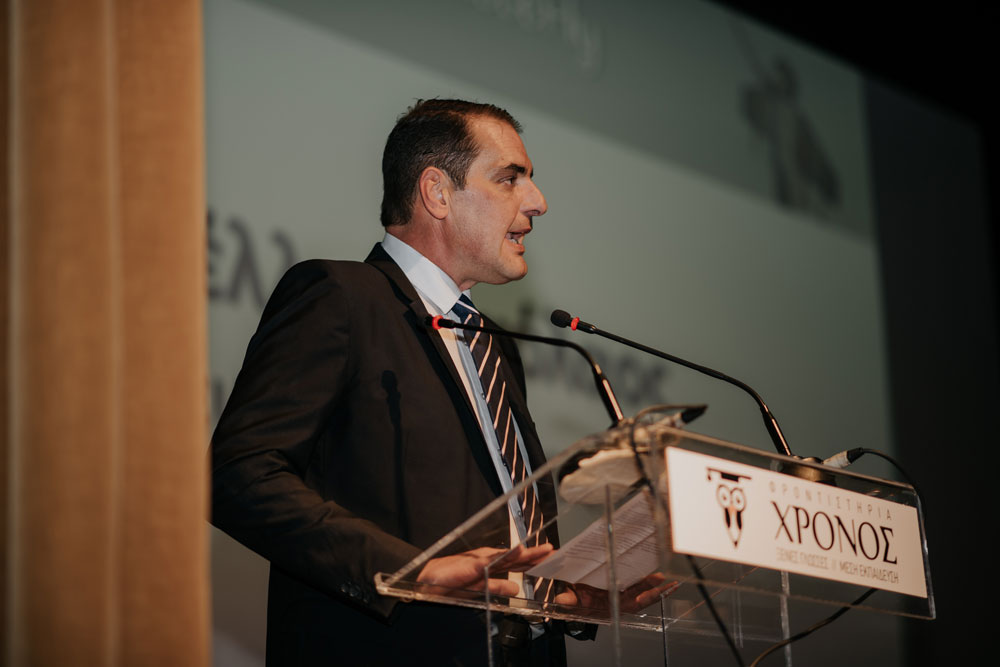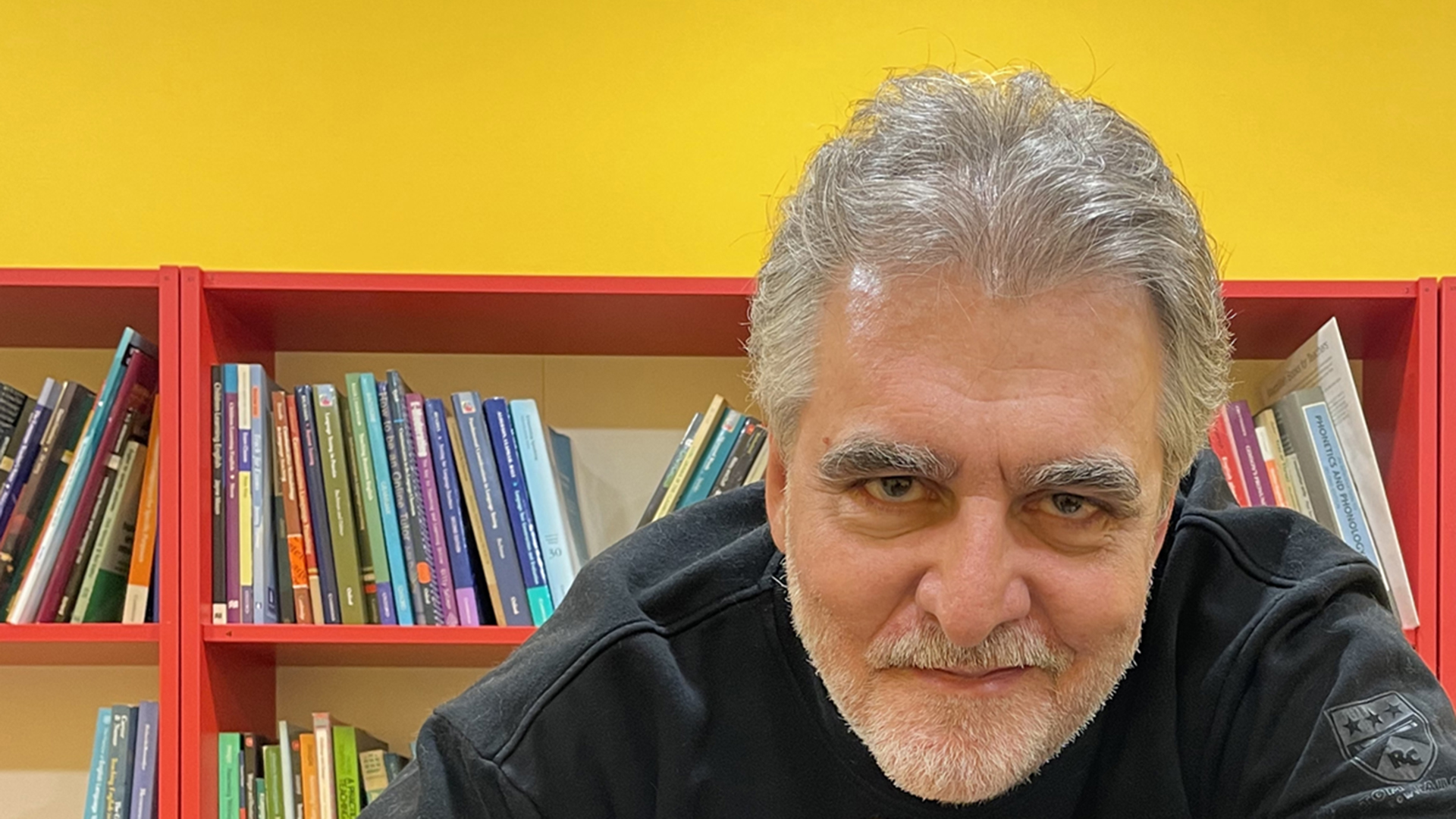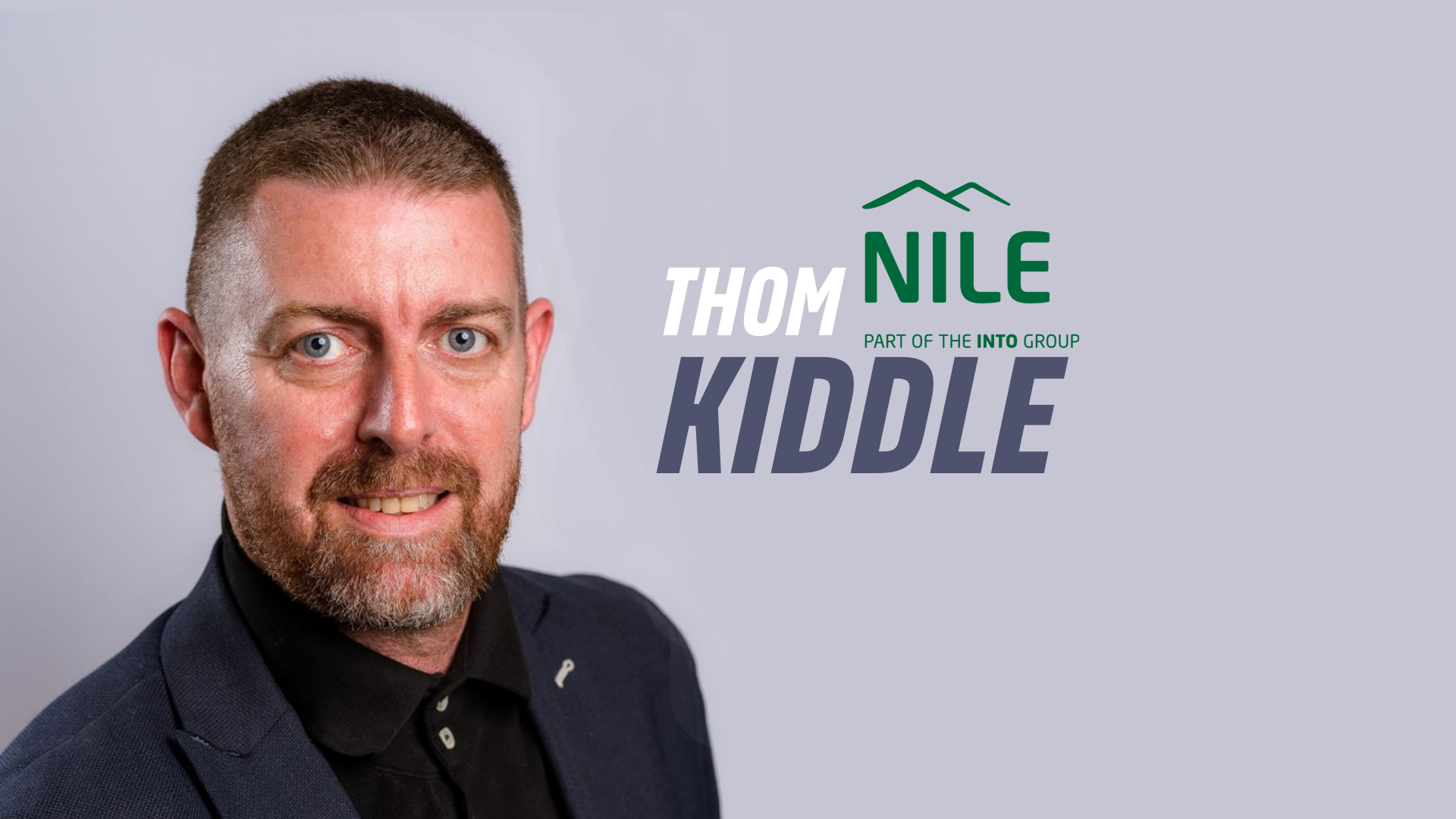On the occasion of ELT NEWS’s 30th anniversary we are happy to publish a series of interviews from ELT personalities who have left their trace in the Greek and international ELT scene. Maria-Araxi Sachpazian BA education / RSA dip/tefl (hons) is the Owner and Managing Director of Input on Education a company which provides academic, business support and consultancy services to Foreign Language Schools. A full-time teacher at an EFL School, Maria is also a part-time lecturer at the International Faculty of the University of Sheffield, CITY College. Since 1997 she has served on many TESOL Macedonia-Thrace, Northern Greece boards and she is now on her second tenure as TESOL Macedonia-Thrace, Northern Greece Chair. She is a volunteer on the IATEFL Digital Committee and a regular columnist for ELT NEWS for the last 8 years.
Did you always want to become a teacher?
To tell you the truth, no! I’ve always loved schools and classrooms but I hugely demotivated by the lack of focus and the climate during our English classes in the state school Senior High School class, which came in stark contrast to the situation at Arsakeio. When I was a teenager, I was sure I would end up on the stage because I loved acting and I could feel there was some talent in me. Unfortunately, there was little family support, so I took my university entrance exams and I got a place at the School of Philosophy and Education of AUTH. At that time, Education as a field of science left me wondering about what those who studied ‘’education’’ actually did. In the years that came, my studies at AUTH, at the British Council, at Study Space as well as at the Online Faculty of the National and Kapodistrian University have done much to shed light to this mystery. I still believe, though, that Education chose me and I must say I am really grateful because this is the best job in the world.
What was the situation in ELT when you started teaching?
I would say that some things were the same, while some others were very different. Foreign language education was always the responsibility of the private sector and parents realized that English was (and has been) an important asset for Greek students, so they registered their children as soon as they could speak. English classes were starting as early as Pre-school in the 1990s and there was great emphasis on certificates and passing exams. A great difference between then and now was the presence of technology. When I first started teaching the chalkboard was the means of getting students attention, along with flashcards and a few other means. There were no IWBs or software or the Internet, which has promoted communication and international communication between ELF teachers. The buzz words in the ELT of the early 1990s were ‘’fun’’ and ‘’creative’’. Another difference I can point out is that back in the 1990s students who did not do the work and actually speak the language, failed their exams. This has changed now and the reasons why it has changed need to be truthfully discussed at some point.
Has teaching changed or do we still teach the way we were taught?
Teaching is a very exact and research-informed science which draws on the findings of much and diverse research. So, of course it has changed. For one thing, we do not now believe that teaching equals learning. The problem as mentioned by Penny Ur in her 2017 Plenary at the BETA-IATEFL Annual Conference in Varna is that teachers actually do not have access to research or they do not bother reading it, because it seems too theoretical and unrelated to their practical classroom-based interests. This sets in motion a chain of consequences: When teachers do not choose what to focus on personally, they outsource this responsibility to others. Therefore, it turns out that our professional field becomes one giant ‘’ball’’ of concern about very specific aspects of our field. These days it’s gamification or the use of technology and teaching students with learning difficulties. My personal concern is whether teachers actually apply what they get out of conferences and sessions. Applying new methods and teaching in ways other than those we were taught is a soul-searching process which requires practical application, but also some reflective practice which resembles action research. Just because a researcher or a trainer says something or the teacher’s book claims that teachers need to teach in this or that way, that does mean that their suggestions match the profile of my learners or cater fully for their needs. Teaching is the ultimate critical thinking process. Professional educators read a lot, listen to more, choose some to put into practice and then select the ones that worked out. This is how we create our personal teaching methodology, relevant to our current teaching context. Unfortunately, when teachers or student-teachers do not have the room to try out these new skills in a supportive (but realistic environment), so as to get feedback from a mentor they trust, they tend to revert to dated teaching practices like translation, a huge emphasis on grammar, memorizing texts and these create a feeling that we have not actually done justice to the decades of Second Language Acquisition Research or to the findings of neuroscience about how our brain learns.
{loadmodule mod_random_image,call to action subscribe in articles}
How difficult is it to change?
It depends on who we are, how supportive our environment is and how or why we are led to the wish to change. According to psychologists, it is all a matter of whether the people themselves realize the need to change. In an EFL context, if I do not realize the need to change my teaching or fully appreciate the need to keep learning and expanding my set of skills, I will probably never venture out of my comfort zone, no matter what I am told. It is true to say that after observations, teachers are told that their class needed better planning or that there was too much TTT or they need to become less dated in the methods and tools they use, but if these teachers themselves do not realize that in the 21st century having learners copy words or rules from the whiteboard, brings about little transferrable linguistic gain, they will not be led to change. Furthermore, Foreign Language Schools and their Academic Managers need to design in-service training schemes which sustain this effort and create a supportive environment in which teachers have the space and time to try to change their ways of teaching and are supported in every step of the way.
If you could go back what would you change in your teaching?
I am afraid this is too general a question. I would need to know which level, which class and which specific lesson. In general, I’d say that one of the things I want to change in the near future is the way CPE students prepare for our class. In order to do that, I need to readjust my own lessons and my teaching, even the type of homework they will be having. I am really interested in creating lessons in which learners can glimpse or at least partly experience the open learning spaces that will be our norm in a couple of years.
The bedrock of more effective and efficient instruction is setting and maintaining meaningful relationships with students. Do teachers know how to do it?
I feel they do and I can say that not only because I am one and most of my friends are English Teachers but also because as member and chairperson of TESOL Macedonia-Thrace, Northern Greece I can see that EFL teachers are amongst the first to realize the importance of affective filter factors in learning. Still, once again, I cannot speak about all teachers. Most of us know that without approaching our students as people and trying to help them see the difference between learning languages and studying other subjects, we will not manage to have a lasting and impactful effect on their lives.
What are the appropriate teacher-student boundaries?
This is very hard to define. Sometimes boundaries are set due to age restrictions or because of the fact that despite the need for a deep and meaningful bond between teachers and learners, the latter are still, most of the time, malleable and impressionable youngsters who might get the wrong idea if too much attention is given to them personally. On the other hand, constantly setting boundaries and enforcing the law can damage and pollute the class climate. Personally, both as a manager and as a teacher I start by studying the handbook so as to gauge what the management of this institution considers inappropriate on top of what I myself consider potentially dangerous. It is also helpful when teachers are monitored and given useful but friendly feedback and the boundaries set by the school are explained. That’s an interesting topic for an article actually, so thanks for the inspiration.
Have you ever felt embarrassed or insecure in the classroom?
Of course I have! As a novice teacher I used to feel very insecure about a number of things. For example, a source of constant worry was how to deal with a question I would not be able to answer off the top of my head. At the time when I started teaching, teachers of English who were not native speakers would have a really hard time if they failed to convince their class of their professional worth. Back then our watches were not connected to the Internet, so it was not so easy to find a quick answer when students were not looking. This made me study harder and plan my lessons down to every detail. It also led me to teach my learners that being able to speak a language, does not mean that we know all the words, but that we are able to decode their meaning from context. Another issue that kept me on my toes was the idea of discipline and respect to the teacher. I was always mindful of how challenging it was to be a fair and effective teacher to all: the rebellious teens, the class clowns, the divas and the charmers. My goal was to manage my learners and our learning environment in a creative way which would not insult their personality or make them hate coming to class. This is the reason why my first professional solo presentation at TESOL Macedonia-Thrace, Northern Greece in 1997 was on this very topic. In a way, these insecurities were a blessing in disguise and the driving force behind my own reflective practice and self-development.
Is teaching a discourse in which everyone waits their turn to speak and no one truly listens? Is it a discourse of memorization in which ready-made phrases, ideas, formulas and patterns are reiterated over and over again?
I don’t see how I can answer this briefly. Personally, I’d say that as teachers of English in Europe in the 21st century, all we do is communicate. How deeply we take in what we hear, clearly depends on who we are. We cannot say categorically, though, that nobody truly listens. There is a lot of research inspired by previous research findings. Blogs and webinars, YouTube channels and online platforms have created a world of free communication in which all teachers can take part but much like going to the supermarket some will buy the day’s groceries, some others will waste a lot of money on nothing and some will only buy matches. Regarding the second part of the question, I think I’ve already touched on this earlier when discussing Second Language Acquisition Research. The fact that teachers do not have the room (or the time) to realize how much their own reflection on their teaching practice matters and how this can function as a springboard to further and deeper discovery, might be the reason why we all follow the ‘’crowd’’ and talk about the same things. It takes a lot of courage to break this cycle and be the one who is different.
Does routine teaching make teachers ‘lazy’?
Once again I need to say that it depends on what we mean by ‘’routine’’ teaching. If it is the idea of everyday teaching that becomes prefatorily and does not change, then yes I believe it does. If we mean if teachers who have been teaching for many years are less eager to explore the secrets of their trade and self-develop, I would say it does not. Of course as professionals, experienced teachers can establish certain routines as long as these do not become too rigid and make the lesson too inflexible. For example, after some years of teaching, teachers can decide which levels or age-groups are their expertise or what kind of teaching setting does not work out for them. I find this as part of the ongoing construction of our teacher’s identity or the teacher-self as my colleague at the International Faculty of the University of Sheffield, CITY College, Dr Vicky Papachristou and I have called it in our recent research project which was first presented in the Language in Focus Conference in Thessaloniki in May 2019. This kind of interest in finding what we are best at makes us better professionals. My personal concern is twofold: On the one hand, EFL teachers are told very early in their careers that they are ‘’junior’’ teachers or ‘’exam’’ teachers and this reminds me the actors in the old, Greek film-noir movies of the 60s in which the same actor was always the villain. On the other hand, teaching seems more ‘’automatic’’ to the inexperienced eye. This is not the fault of the publishers, trainers or ELT stakeholders. It is more a matter of perception. Teaching material design has progressed to a great extent and right now published material for any level comes to us packed with IWB software, flashcards, platforms, websites and also overprinted teachers’ materials. This is not because teachers do not need to plan anything. It is because materials’ developers know that day-to-day teaching is too hard and times are difficult so teachers work for many hours a week, therefore creating their own flashcards or creating material for their digital platform is neither easy nor practical. Unfortunately, this very same situation has led teachers to feel that ‘’one-size-fits-all’’, so they establish a routine and stick to the material they are given (it seems by a divine ELT force that knows their class better) conveniently forgetting that without consistent planning, no material has the potential to help their learners. To be honest, I am a bit tired of too perfect material. I feel that unfortunately it has led some teachers take advantage of it in the wrong way and they may well feel that the message conveyed is that teachers are not the key players in education, but simply the pawns on the larger ELT chessboard. Perhaps, this is why so many teachers from so many different parts of the world had such warm reaction to Paula Rebolledo’s plenary on Teacher Empowerment at the 53rd IATEFL Conference at Liverpool, this year. One thing that needs to be said about laziness and empowerment, though, is that they both take more than one to tango and considerable work is needed for teachers not to fall into a kind of ‘’teaching hibernation’’.
How do you see ELT in say…10 years from now?
It depends on geography and broader social issues, I’m afraid. Right now the global tendencies show greater interest in inclusivity through the presence of diverse social, ethnic and family contexts in the ELT materials. I believe this is a trend we will see very soon in published teaching material and which might spur even a socio-cultural debate and become the reason why local schools might prefer more ‘’mainstream’’ published materials. Another change to be seen in the next 10 years will be the increasing emphasis on the way we educate and include learners with different needs. For example, this year at IATEFL 2019 we had the chance to hear a lot about how the needs of colour-blind students are not taken into consideration, when designers create the layout of coursebooks or even digital materials. Finally, we have seen that full-frontal teaching and classrooms with desks in rows constitute a dated setting for teaching and learning. It is my personal belief that the new learning spaces (on which I had the chance to write two articles for ELT News in 2017-8) will rock the foundation of what we consider ‘’lesson planning’’ or even the type of materials we use and how we exploit them in class. A direct consequence of that will be an avalanche of changes in teacher education and in-service training. How fast we see these changes will, as mentioned before, depend on where in the world we work.



